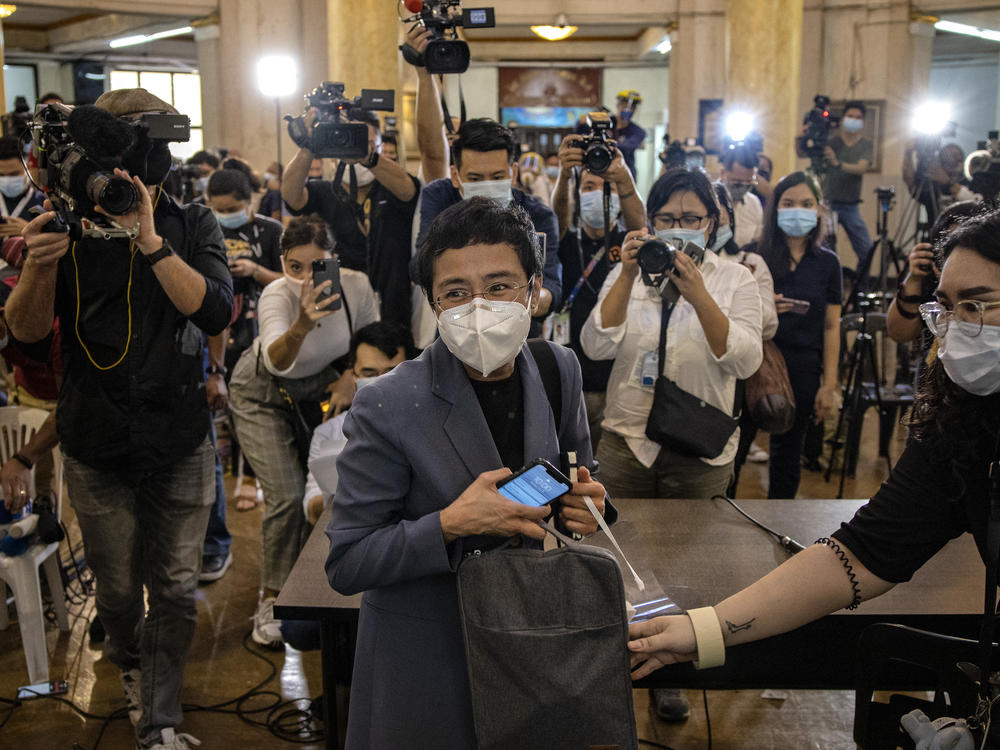Section Branding
Header Content
Philippine Journalist Maria Ressa: 'Journalism Is Activism'
Primary Content
"In a battle for facts, in a battle for truth, journalism is activism," says Philippine journalist Maria Ressa.
Ressa, who is internationally known and lauded for standing up to Philippine President Rodrigo Duterte's escalating attacks on the press, tells NPR that circumstances in the Philippines have forced her to evolve as a journalist.
Her news organization's battles against online disinformation and Duterte's administration are the focus of A Thousand Cuts, a documentary that debuted in January at the Sundance Film Festival and will be released virtually in the U.S. this Friday.
Though the film focuses on the Philippines, the issues it touches on aren't unique to that country. "Obviously this disinformation is happening everywhere," says filmmaker Ramona S. Diaz.
Ressa and Rappler, the Manila-based news site she runs, first drew the ire of the Duterte administration soon after he took office in 2016. Rappler started critically covering the president's brutal war against drugs and has remained in Duterte's crosshairs as his crackdown on the press has intensified.
Over the years, Ressa has seen her reporters expelled from the presidential palace, endured near-constant attacks by pro-Duterte trolls and navigated a slew of lawsuits.
She tells NPR it was her arrest on charges of cyber libel in February 2019 that changed her thinking about her role. Ressa realized her detention was an abuse of power. On posting bail, she says, "I just started speaking in a way that I would probably not have done," given her traditional journalistic training.
Almost immediately after her release, Ressa began to speak more openly against abuse of power and the "weaponization" of Philippine law against journalists and government critics, and appealed for others to do the same.
Becoming part of the story has been a "challenge," she tells NPR. But "When your own rights have been abused and you have evidence of that abuse of power, why should you not speak, especially if the data backs it?" she says.
Ressa, 56, was convicted in June. The verdict came against the backdrop of the COVID-19 pandemic, another battlefield on which she and Rappler have combated the Duterte administration — over disinformation on the government's handling of the crisis as well as the right to criticize its response.
The Philippines has now crossed into its 20th week of strict lockdown, and virus cases continue to soar.
And while a lot has happened since A Thousand Cuts wrapped last year and Ressa still faces the possibility of jail, she says she won't be deterred from doing her job.
Highlights of NPR's interview with Ressa follow, edited and condensed for clarity.
INTERVIEW HIGHLIGHTS
On hearing the verdict in her cyber libel case
I didn't want to be physically in that court because we were still in the middle of a lockdown, but the court decided that we all had to show up. So there we were with our masks, with our shields. And I had to listen to the clerk of court read out the the verdict.
So I took out my notebook and I just started taking notes, and then within two minutes... I just shut my notebook and I stopped taking notes because I knew where it was headed.
On the demonization of journalists
Journalist equals criminal, which is the alternate reality.
This is how you transform a democracy. This is death by a thousand cuts.
The same thing is happening in the United States.
I think the goal of influence operations or information operations is to seed it, repeat it, incite hate and ... change the way real people think, and that impacts the real world. This is happening all around the world. That's what the research has shown us, that's what the data shows us.
On the role of social media in spreading disinformation
What we call social media is a behavioral modification system... And there are many [platforms] and they're all American, the ones that are here in the Philippines. That platform has your data, knows you better than you know yourselves. And to the highest bidder, with micro-targeting, will sell your most vulnerable moment to a message, whether it is to an advertiser or to a government.
And when you're given that, it will change, can change, the way you think and ultimately, the way you act. ... And the first step really is to demand accountability from the social media platforms. They've got to stop impunity of these information operations or these influence operations. They have to stop manipulation at mass scale.
On navigating the pandemic in addition to legal cases
You know what Nietzsche said about what doesn't kill you makes you stronger? That's precisely where I am and where Rappler is. We've been under attack for four years. The conviction shows me the runway to jail is shorter, but at the same time, I refuse to let it get in the way of doing our jobs.
Copyright 2020 NPR. To see more, visit https://www.npr.org.

